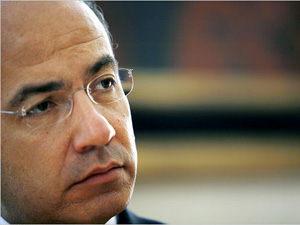
|  |  |  Editorials | Opinions | January 2009 Editorials | Opinions | January 2009  
Mexico's President Could Learn from Obama & Bush Models
 Patrick Corcoran - MexiData Patrick Corcoran - MexiData
go to original


| | Felipe Calderón will never inspire the multitudes the way Obama does, but there’s no reason he can’t borrow his willingness to occasionally splash cold water over his listeners. |  |
As great as the gap between the policies of Barack Obama and George W. Bush may turn out to be, the difference in their communicative style will likely be greater. The simplest explanation for this is that Obama is an outstanding speaker while Bush is not; that's certainly true, but the differences are deeper.

Obama became famous for his soaring rhetoric, but, beyond that, he shows an abiding faith in his audiences’ ability to grasp difficult ideas and absorb unfortunate information. His discourse since his election has been noticeably earthbound, and he has shown little hesitation in delivering somber prognoses. In David Ignatius’ words, "The new president opened his inaugural address by reminding us how bad things are. He spoke not of sunny skies and amber waves but of 'gathering clouds and raging storms.'"

The contrast with Bush is striking; the outgoing administration rankled Americans with its relentless focus on message in place of honest analysis, and its unwillingness to face up to bad news (aside from when it manipulated the nation’s fear for electoral gain). From his misleading descriptions of Iraq to his inability to name even one mistake during the 2004 campaign, Bush’s obstinate optimism has done a thorough job in eroding his credibility. The result was a president who was seen as little more than a PR flak for his own administration.

Felipe Calderón should take a lesson from these two leaders. The Mexican president will never inspire the multitudes the way Obama does, but there’s no reason he can’t borrow his willingness to occasionally splash cold water over his listeners.

One unfortunate habit Calderón shares with Bush is that he tends to be very specific in discussing his government's achievements, but drifts into platitudes when he talks about all of the challenges Mexico faces. All politicians display a periodic affinity for spin, but Calderón, like Bush, drowns himself in the stuff.

Take this December speech excerpt, which came in the wake of Operation Clean-up, the investigation that revealed a welter of high-ranking officials taking payments from drug gangs:

“In these two years the authorities have brought to justice 53,000 people linked to crime, among them some of the most sought after drug cartel kingpins and lieutenants that operate in this country, and some that operate abroad.

“With their detention it is clear that the federal government hasn’t negotiated, nor will it negotiate, with any organized crime, and that it combats without distinction all those who attack the life, the security, and the peace of Mexicans.”

Those words may be uplifting, but they do nothing to address the nation’s core security concern: the number of robberies, kidnappings, and dead bodies keeps growing, but no one from Calderón’s camp can offer an explanation of how this relates to the government’s road map for a safer Mexico, much less venture a guess as to when crime will drop.

Calderón's comments on the economy have been likewise cheery; he recently bragged about Mexico being among the most macro-economically stable countries in the world. Even if you buy the analysis, that’s a bit like crowing about having a first-class cabin on a sinking ship. Mexico just slogged its way through one of the most trying years in a generation, but instead of leveling with Mexicans about the scope of the problems, Calderón's says things like, "[A]dversities make the task of governing much more fascinating."

Calderón remains popular in Mexico, but one senses that should he remain a stalwart optimist through another year that registers a record number of executions and a declining economy, his words will be as easily discarded as Bush's.

And this isn’t just a matter of semantic aesthetics. About Obama’s inaugural speech, Ignatius wrote that not only did he lay out the problems, but “he told us that it was partly our fault.” Acknowledging that uncomfortable truth was a big step in countering the bad habits that resulted in the financial crisis.

Mexicans could use some of that bitter-tasting medicine (though not so much in regard to finance), but it can’t come from a president who doesn’t level with his country.

Patrick Corcoran is a writer who resides in Torreón, Coahuila. He blogs at Gancho. |

 |
|  |



